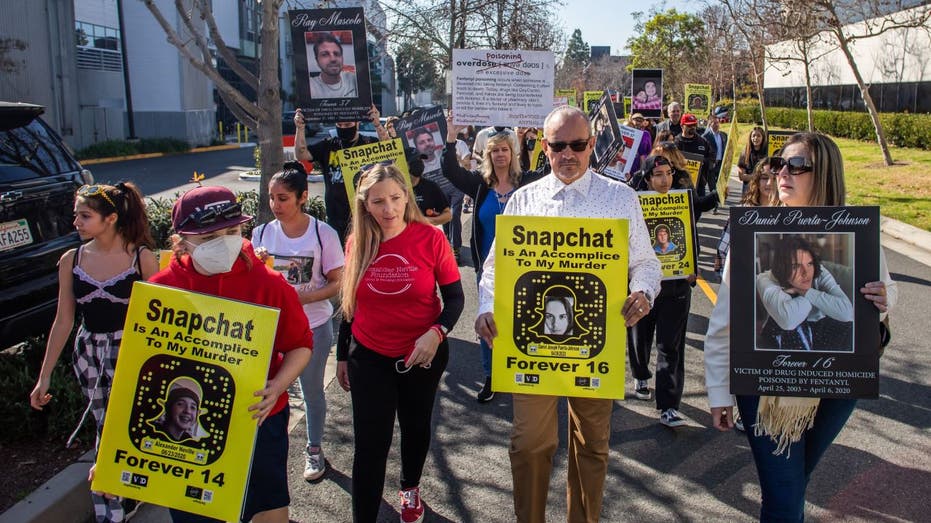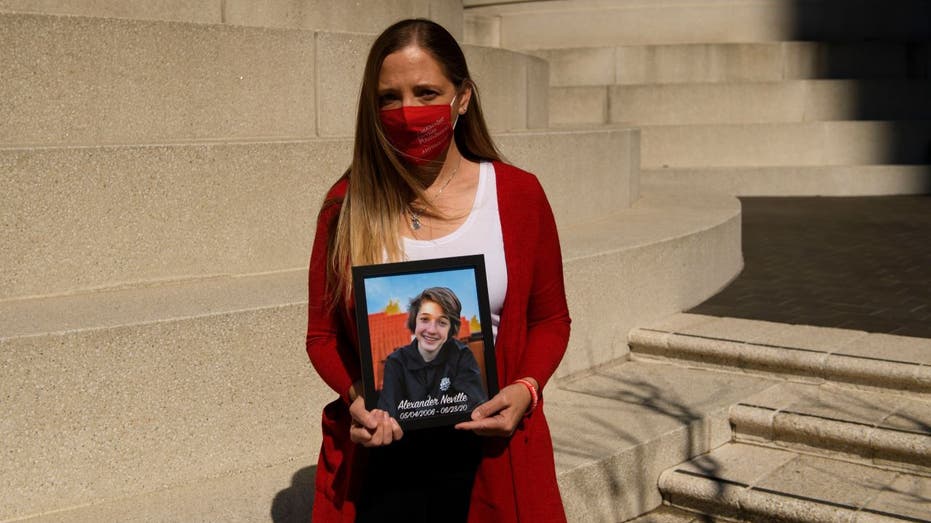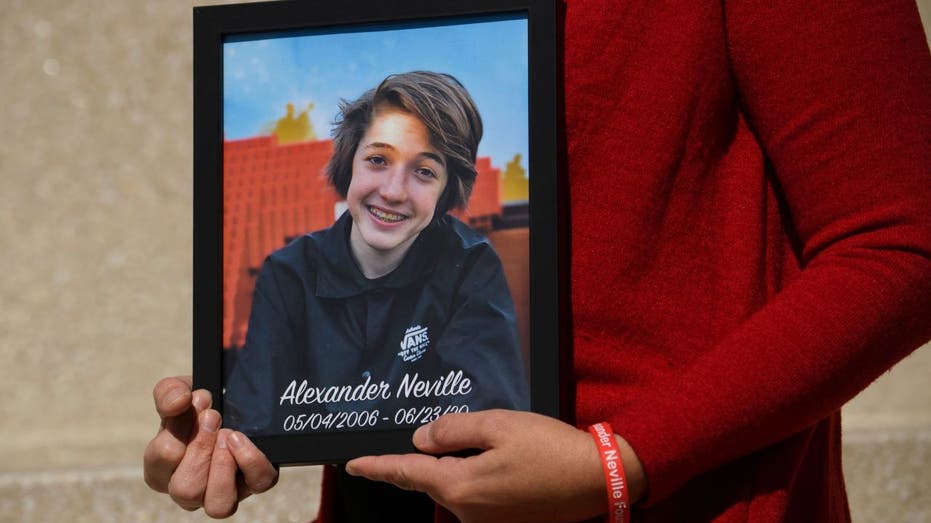Mother whose son died from drugs bought on social media wants stronger protections for kids
Amy Neville says that social media companies should implement stronger safeguards and not wait for Congress to act
Big Tech companies have ‘overstepped’ their boundary with underage users: Kara Frederick
Heritage Foundation tech policy director Kara Frederick says Facebook has intentionally targeted young users despite concerns over social media’s impact on mental health.
Amy Neville, whose teenage son died of fentanyl poisoning after obtaining counterfeit pills he obtained from a drug dealer on Snapchat, is calling for Snap and other social media companies to implement stronger safeguards for children on those platforms.
"These days, my life’s work is traveling the country and educating folks on social media harms and the drug crisis as it is right now, and that all stems from the fact that I lost my own child, Alexander, who was 14 years old when we lost him," said Neville, president of the not-for-profit Alexander Neville Foundation, told FOX Business.
She explained that Alexander had expressed a curiosity about experimenting with drugs when he was younger and that one day something seemed off with him. He initially brushed it off when she asked him if he was on something and told him she wanted to take him to the doctor.
"But a day and a half later he came back to us and told me, ‘Okay, I gotta talk to you guys.’ We sat down at the kitchen table, and he proceeded to pour his heart out to us, but three key things came out of that conversation and that was ‘I wanted to experiment with oxy, I got some from a dealer on Snapchat, it has a hold on me and I don’t know why,’" she explained.

Amy Neville (3rd L) and Jaime Puerta (2nd R) whose children died from fentanyl poisoning protest against illicit drug availability to children on the app Snapchat near the Snap, Inc. headquarters, in Santa Monica, California in January 2022. The coal (Photo by APU GOMES/AFP via Getty Images / Getty Images)
"We did what anybody would do, we called a treatment place the following morning and that place needed to call me back with their recommendation, and so we went about our business that day, and that night Alex died. Everything happened really fast, like death was not on the radar," Neville said.
Alexander had taken counterfeit pills that were laced with fentanyl, which resulted in his death in June 2020. Neville said the tragedy spurred them to take action by raising awareness of the threat social media can pose to children.
| Ticker | Security | Last | Change | Change % |
|---|---|---|---|---|
| SNAP | SNAP INC. | 5.18 | -0.04 | -0.77% |
"There was a lot that was not being talked about at that time – one being the issue with fentanyl and counterfeit pills, and the other being the depth of social media harms," she said. "So we set out to learn everything we could about these things, met with lots of really amazing experts. And then, after all that work, we set out to create some content. Something was still missing and that was the youth perspective, so everything we do is youth-informed."

Amy Neville stands with a picture of her son, Alexander Neville, who died of fentanyl poisoning after buying counterfeit pills from a drug dealer on Snapchat. (Photo by PATRICK T. FALLON/AFP via Getty Images / Getty Images)
"Of course, parents – their knee-jerk reaction is to want to delete Snapchat off their kid’s phone, and I always tell them that’s a whole other set of problems, because their kids have probably been using it for a bit, they’re probably hooked on it because the app is designed for addiction with the snap streaks, the dopamine hits, that compulsion to have to go back to the app."
Neville said that she tells parents to ask their kids what they know about drugs on Snapchat and if they have seen drugs on the platform, as their child may open up because "we know that our teens like to be smarter than us" and that may offer them an opportunity to demonstrate that.
"I recommend spot-checking your kid’s social media. We did that with Alexander… but at the time no one was talking about the drug emoji code and so had I seen something I may not have even recognized it – I was looking for the bullies and the pedophiles," she said. "The other I tell parents is, if your kids are going to be on these apps, you have to be on them too."

Alexander Neville died of fentanyl poisoning at the age of 14 in 2020. (Photo by PATRICK T. FALLON/AFP via Getty Images / Getty Images)
She added that parents should follow the things their kids are following to see what content is in their feeds and to have an agreement with their children that they can go on their account at any time they want.
By spending five to 10 minutes looking at their child’s feed, parents can get a better feel of what their children are seeing.
SOUTH CAROLINA LAWMAKER WHOSE SON DIED BY SUICIDE AFTER SEXTORTION SCAM FILES LAWSUIT AGAINST META
Neville and a group of other families who lost children to overdoses caused by drugs obtained via Snapchat filed a lawsuit against Snap, the company that operates the social media platform. She said the suit is the first of its kind and that it’s progressing to the discovery stage this month.

Amy Neville says that parents should ensure they know what their children are viewing and interacting with on social media. (Photo by Matt Cardy/Getty Images / Getty Images)
Several CEOs of leading social media companies, including Snap, TikTok, X, Discord and Meta – the parent company of Facebook and Instagram – testified before the Senate Judiciary Committee on Wednesday about social media threats posed to children. Senators and the executives discussed several bills that have been considered in the current Congress.
Neville said that she supports provisions of the Cooper Davis Act, which requires social media companies to self-report the drug content on their platforms. She also backs provisions in the Kids Online Safety Act that would require independent third-party audits of social media platforms and impose a duty of care on those platforms.
X CEO LINDA YACCARINO TO OUTLINE PLATFORM’S MEASURES AGAINST CHILD SEX ABUSE AT SENATE HEARING
She added that while Snap CEO Evan Spiegel said the company supports pieces of legislation that would look to counter some of the risks posed to young people by social media, he should take action now to implement the policies in the legislation rather than wait for Congress to enact those bills.
"He said yes to the Cooper Davis Act, and he said yes to the Kids Online Safety Act," Neville said. "He doesn’t need Congress to put those things into play, he can put those into action right now in his company. Why wait for Congress to act?"

From left to right, Jason Citron, CEO of Discord, Evan Spiegel, CEO of Snap, Shou Zi Chew, CEO of TikTok, Linda Yaccarino, CEO of X, and Mark Zuckerberg, CEO of Meta look on as they testify before the Senate Judiciary Committee on Jan. 31, 2024 in Wa (Photo by Alex Wong/Getty Images / Getty Images)
GET FOX BUSINESS ON THE GO BY CLICKING HERE
A Snap spokesperson told FOX Business in a statement that the "fentanyl epidemic has taken the lives of too many people and we have deep empathy for families who have suffered unimaginable losses."
"At Snap, we are working diligently to stop drug dealers from abusing our platform, and deploy technologies to proactively identify and shut down dealers, support law enforcement efforts to help bring dealers to justice, and educate our community and the general public about the dangers of fentanyl," the spokesperson said.
Snap says that many of the provisions of the Kids Online Safety Act are consistent with existing safeguards on the platform, such as setting teens’ accounts to the strictest settings by default, offering additional privacy and safety protections for teens and in-app tools for parents and reporting harmful content.




















